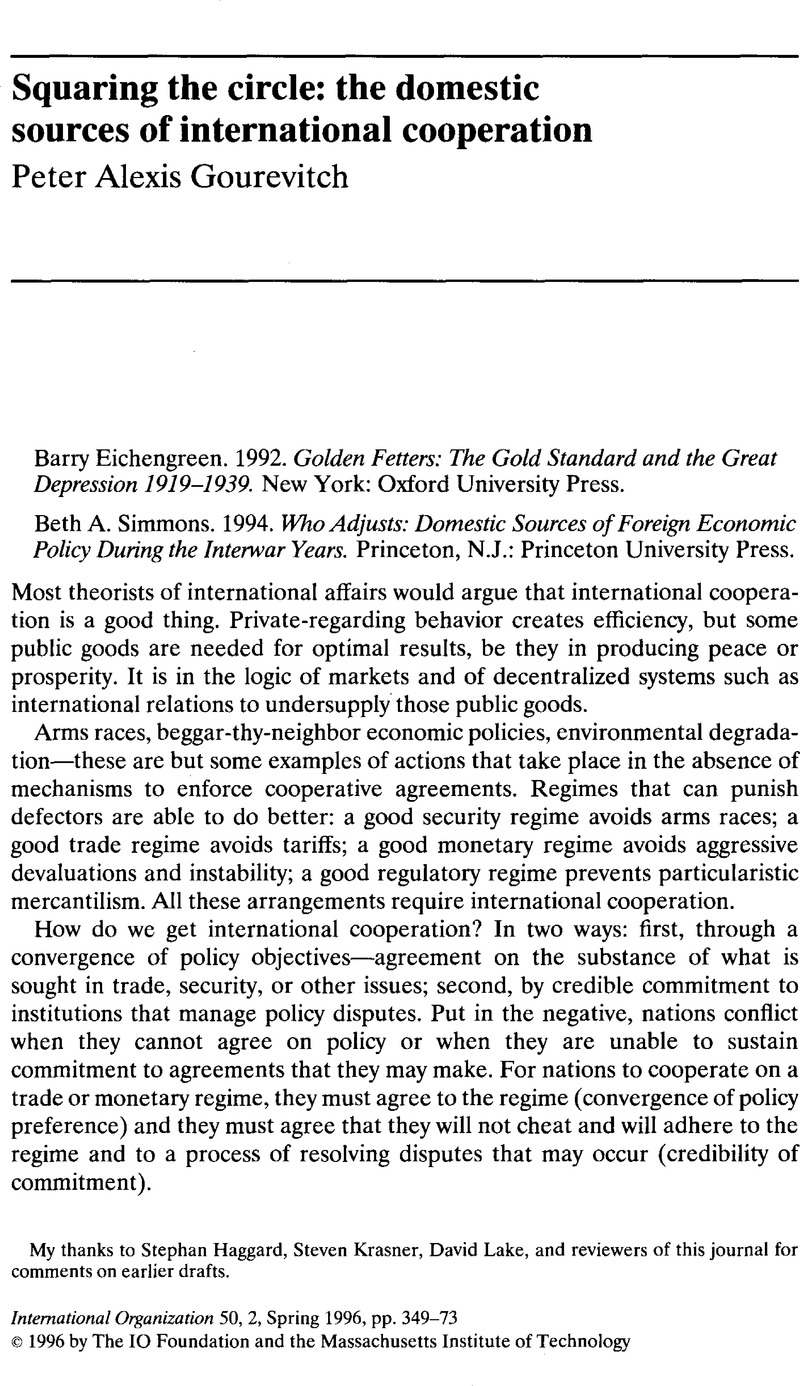Crossref Citations
This article has been cited by the following publications. This list is generated based on data provided by Crossref.
Raustiala, Kal
1997.
Domestic Institutions and International Regulatory Cooperation: Comparative Responses to the Convention on Biological Diversity.
World Politics,
Vol. 49,
Issue. 4,
p.
482.
Haas, Peter M.
1998.
Compliance with EU directives: insights from international relations and comparative politics.
Journal of European Public Policy,
Vol. 5,
Issue. 1,
p.
17.
Jordan, Andrew
1998.
The Ozone endgame: The implementation of the Montreal Protocol in the United Kingdom.
Environmental Politics,
Vol. 7,
Issue. 4,
p.
23.
Barrios, Harald
1999.
Die Außenpolitik junger Demokratien in Südamerika.
p.
389.
McGillivray, Fiona
and
Smith, Alastair
2000.
Trust and Cooperation Through Agent-specific Punishments.
International Organization,
Vol. 54,
Issue. 4,
p.
809.
van Kersbergen, Kees
Lieshout, Robert H.
and
Verbeek, Bertjan
2000.
Governance in Modern Society.
Vol. 4,
Issue. ,
p.
35.
Kollman, Kelly
and
Prakash, Aseem
2001.
Green by Choice? Cross-National Variations in Firms' Responses to EMS-Based Environmental Regimes.
World Politics,
Vol. 53,
Issue. 3,
p.
399.
Lee, Jong-Sup
and
Heo, Uk
2001.
THE U.S.- SOUTH KOREA ALLIANCE.
Asian Survey,
Vol. 41,
Issue. 5,
p.
822.
Haas, P.M.
2001.
International Encyclopedia of the Social & Behavioral Sciences.
p.
11578.
Cadot, Olivier
and
Webber, Douglas
2002.
Banana Splits: Policy Process, Particularistic Interests, Political Capture, and Money in Transatlantic Trade Politics.
Business and Politics,
Vol. 4,
Issue. 1,
p.
5.
Hamilton-Hart, Natasha
2003.
Asia's new regionalism: government capacity and cooperation in the Western Pacific.
Review of International Political Economy,
Vol. 10,
Issue. 2,
p.
222.
Sharman, J. C.
2004.
Who pays for entering Europe? Sectoral politics and European Union accession.
European Journal of Political Research,
Vol. 43,
Issue. 6,
p.
797.
McGillivray, Fiona
and
Smith, Alastair
2004.
The Impact of Leadership Turnover on Trading Relations Between States.
International Organization,
Vol. 58,
Issue. 03,
McGillivray, Fiona
and
Smith, Alastair
2005.
The Impact of Leadership Turnover and Domestic Institutions on International Cooperation.
Journal of Conflict Resolution,
Vol. 49,
Issue. 5,
p.
639.
Pepinsky, Thomas B.
2005.
From Agents to Outcomes: Simulation in International Relations.
European Journal of International Relations,
Vol. 11,
Issue. 3,
p.
367.
Levi-Faur, David
2005.
The Global Diffusion of Regulatory Capitalism.
The ANNALS of the American Academy of Political and Social Science,
Vol. 598,
Issue. 1,
p.
12.
Haworth, Nigel
Hughes, Stephen
and
Wilkinson, Rorden
2005.
The International Labour Standards Regime: A Case Study in Global Regulation.
Environment and Planning A: Economy and Space,
Vol. 37,
Issue. 11,
p.
1939.
Chorev, Nitsan
2007.
A fluid divide: Domestic and international factors in US trade policy formation.
Review of International Political Economy,
Vol. 14,
Issue. 4,
p.
653.
Dai, Li
2009.
Caught in the middle: multinational enterprise strategy in interstate warfare.
Competitiveness Review: An International Business Journal,
Vol. 19,
Issue. 5,
p.
355.
Van de Graaf, Thijs
2011.
Fragmentation in Global Energy Governance: Explaining the Creation of IRENA.
SSRN Electronic Journal,



